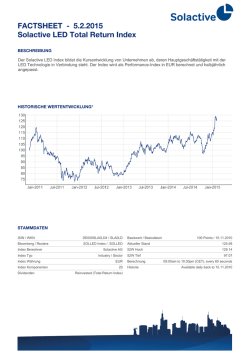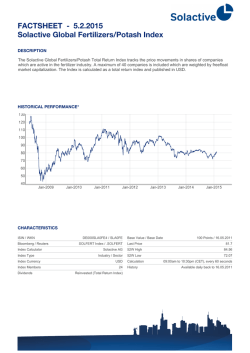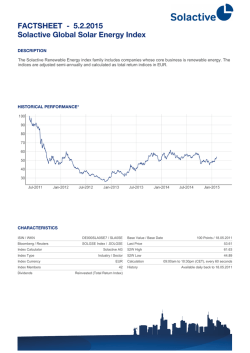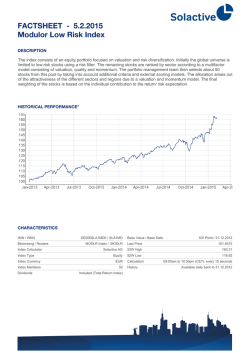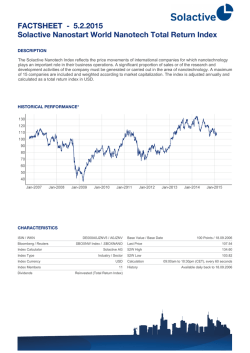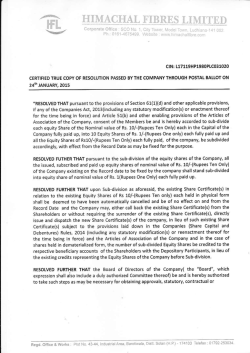
download pdf
WHY WE ARE VOTING “NO” IN THE ALLAN GRAY EQUITY FUND BALLOT Dear Investors, If you are a small retail investor and this fund makes up the majority of your investment portfolio, then you could be well served to diversify further offshore in a tax friendly manner and should vote YES to the proposed changes if your embedded capital gains is relatively large and wealth management compass is unaffected after reading our reasoning below. As a holder of units in the Allan Gray Equity Fund you would have received a notice (“Proposed changes to the Allan Gray Equity Fund”) on the 3rd of December 2014. Cordatus is voting “NO” to the proposed changes on behalf of investors where we have discretion and our recommendation to investors, where we act in an advisory capacity, is similar. We debated the issues below ad nauseam internally at Cordatus as we believe this ballot represents an important point in the retail industry evolutionary process. Our rationale for the “NO” vote is as follows; Proposed change #1: Allow the fund to invest up to 25% in global equities and a further 5% in African equities • Let’s start with the obvious. When we first invested in this fund we knew that we were buying SA equity exposure (that’s what it said on the tin!) and were content with that limitation. Over time our returns from this fund has been in line with expectations and we have been very happy. Our rejection of the ballot is not about offshore equity per se, it is about changing the rules halfway through the game! • Cordatus makes use of a number of offshore options when constructing client portfolios. The amount to be invested/exposed to offshore markets is a function of inter alia liability matching (e.g. ZAR income needs), inflation protection levels (i.e. real return requirement), volatility profile and asset valuation. Thus, we require a large degree of control over the offshore exposure of our investors, which is derived and then aligned with the risk profile and return requirement (risk capacity, risk tolerance and risk requirement) of each investor. Voting NO will ensure the offshore allocation (across multiple holdings and asset classes) of investors is not compromised by geographic decisions taken at Allan Gray within the AG Equity Fund. I would hazard a guess that once they have moved the 30% allocation into offshore controlled funds the chances of them actively managing this position (i.e. ever repatriating the funds) are negligible, regardless of currency view. • With the fund using only Orbis Funds for the global equity component (30% max), where an investor has an existing position in Allan Gray Global Equity FF and/or Orbis Global Equity Fund, the position size is increased in terms of offshore manager exposure. We advocate diversification as a core philosophy at all levels (including global equity manager level) and this risk mitigation tool/practice is thus compromised to a larger or lesser extent as a result. • Ignoring the importance of market/instrument valuations being conducive or not, a growing trend within investor portfolios is to make greater use of low cost index options when investing globally. We support this move and given the wide variety of cost-effective options available to Cordatus as custodians of your wealth, we would prefer to allocate this component of your offshore exposure accordingly when intra-class valuation ranges allow. Proposed change #2: Change in fund benchmark While we agree that should an SA equity manager be allowed to invest offshore within their fund that the JSE All Share Index is no longer appropriate, the proposal by AG to use the sector average (value-weighted average return, excl AG) as a benchmark is, in our view, not appropriate either. By way of illustration; In the table below we list the 10 largest funds (excluding AGEF) in the SA – Equity – General sector (all data from Morningstar as at 31/12/2014). A few points become very important given that the sector average benchmark is asset weighted. • • • The AGEF is R40 billion in size. The top 10 funds (excl AG) currently make up 54% of the sector. 90% of those top 10 funds do not invest offshore directly (after a quick glance at latest fact sheets). Thus, we are not subscribing to the AG argument on four important fronts; • • • • The sector average (whether weighted or not) has very little in its’ favour as a point of reference in measuring the returns of AGEF against our reference benchmark of the JSE All Share Index (incl dividends). What’s so difficult with using a composite benchmark of 75% FTSE/JSE All Share + 25% MSCI World Index. This would allow them plenty of opportunity to add alpha and not just on the currency. The largest 8 managers do not have direct offshore exposure within their fund as an addition so the argument as to this point is rendered obsolete. Of the largest SA shares, the vast majority are offshore directed (e.g. SAB, BTI, etc) and the expansion plans of most SA companies is decidedly externally. The age-old argument that the size of your fund does not matter seems to have been forgotten in this proposal or at least been conveniently glossed over. We expect AG to do their best within the funds’ investment universe of SA equity. We will take the punches as markets falter and will share in the good times. Given that valuations are high in the larger cap shares where AG is “forced” to play we get the distinct feeling that this ballot point is more about managing the AG business risk toolkit than applying tried and tested valuation analysis over full cycles. AGEF: WHY WE ARE VOTING “NO” CORDATUS CAPITAL (PTY) LTD – JAN 2014 FUND NAME Coronation Top 20 A Nedgroup Inv Rainmaker A Old Mutual Investors R Foord Equity R STANLIB MM Equity A1 Coronation Equity R Investec Equity R Oasis Crescent Equity D Prudential Dividend Maximiser A SIM General Equity R SIZE 22 066 545 042 15 931 163 986 12 046 427 841 11 010 862 707 10 893 833 579 7 429 098 473 6 923 362 005 6 365 821 567 5 328 007 294 5 301 140 272 TOP 10 (EXCL AG) % OF SECTOR 103 296 262 766 54.0 OFFSHORE NO NO NO NO NO NO NO NO YES YES BENCHMARK FTSE/JSE TOP40 SECTOR AVERAGE FTSE/JSE SWIX FTSE/JSE ALSI SECTOR AVERAGE FTSE/JSE SWIX FTSE/JSE ALSI SECTOR AVERAGE SECTOR AVERAGE FTSE/JSE ALSI Proposed change #3: Change in fund fee structure AG is proposing the following • • • • A reduction in the base fee from 1.5% to 1% per annum. The uncapping of performance fees from a 3% cap. A change in the measurement period from rolling 2 years to daily with a high watermark. The sharing rate to be increased from 10% to 20%. While reducing the base fee is always welcome from big funds (after all, the cost structure of the fund does not change), the uncapping of performance fees is not, as the distinction between fair reward, greed and avarice is poorly defined as a result. The biggest problem we have with the increase in the sharing rate (a misnomer if there ever was one – believe me, they are not giving you anything!) is that the new benchmark now plays a very important part in the calculation. Namely, AG is now asking you to pay them 1% if they perform in line with the weighted sector average (comprising 139 funds currently). Surely you invest with a company in the belief that they are better than average and are applying their best efforts at all times! Evidently this is not the case, in that you are now being asked to reward (with no limits) AG if they just do better than average. Somewhere along the line all reference to the JSE All Share index will be lost and just what do you use as your reference point in future? Imagine if all the managers in the sector had the sector average as a benchmark? The mind boggles at the mediocrity this would encourage. Proposed change #4: Inclusion of derivatives We wholeheartedly support this alteration to the Trust Deed. The ability to undertake nonspeculating hedging positions and alter market/instrument exposure inexpensively is always welcome. AGEF: WHY WE ARE VOTING “NO” CORDATUS CAPITAL (PTY) LTD – JAN 2014 In summation The only way we could vote in favour of this ballot was if the proposals on these 4 items were; • • • • #1: The 30% direct offshore exposure was not proposed. The fund remains SA equity centric. #2: The benchmark remained relevant to investors (the FTSE/JSE All Share Index TR). #3: The performance fees remained capped, regardless of the sharing rate and dubious reference point for calculating the “gun & mask” level. #4: Derivatives were included (this is the only proposed change that makes sense to us as allows for limited protection and off market adjustments). Thus, if you are a larger investor where you self-direct manager, asset class and offshore allocations, then you are not being well served by these proposals in our view. Focus within diversification should always be advocated for the successful long-term investor with a defined risk / return target wealth objective. At an Allan Gray presentation on 28th October 2014 in their fantastic new auditorium the large audience (primarily IFA’s) was asked whether they would support these proposals. I did not count hands but would confidently predict (given the look on the faces of AG personnel) that in excess of 90% of the audience said NO. The problem is, it does not matter what we think, as, for a ballot to pass you only need >50% of a minimum of 25% of unit holders for a resolution to pass. Thus 12.5% of units will be able to make this decision for the rest of us. Given that many investors in the AGEF are institutions (either controlled or directed), I would hazard a guess that the ballot is a mere formality. What to do if you want out? Not agreeing with AG on these proposals is one thing, voting with your feet could however be a very costly option to pursue given your embedded unrealised capital gain within the fund. Fortunately, we have mechanisms to help you in this regard and should you wish to find out more, give us a shout. CRAIG McKAY 28 January 2015 AGEF: WHY WE ARE VOTING “NO” CORDATUS CAPITAL (PTY) LTD – JAN 2014
© Copyright 2026
